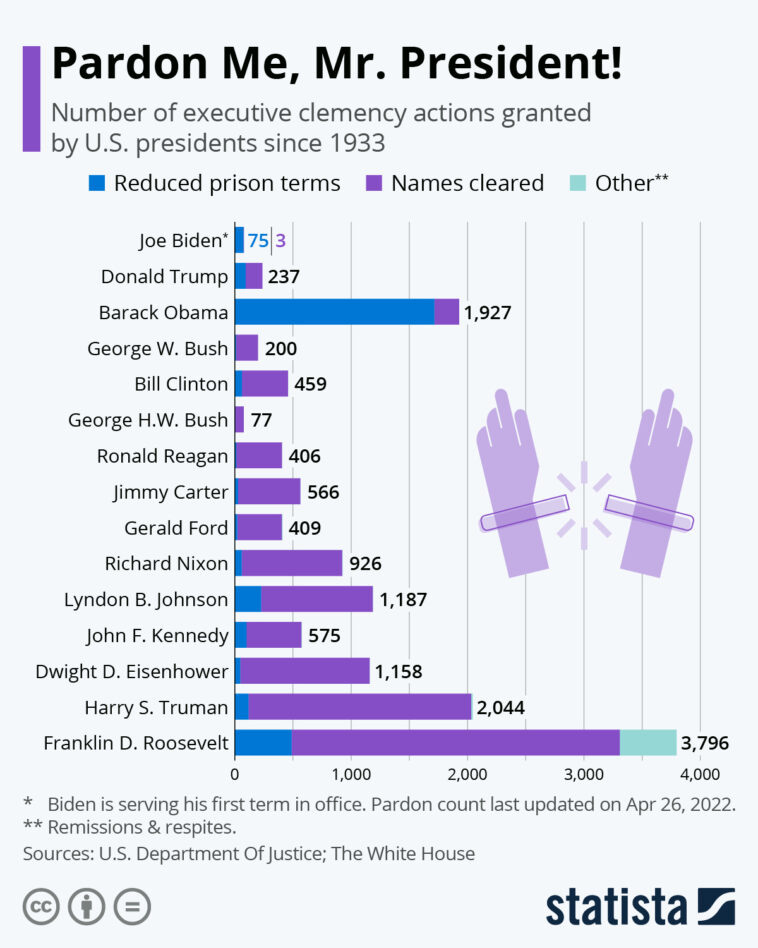The Trump team and supporters have undeniably initiated inquiries to validate their suspicions that Joe Biden might not have been in control during his presidency, and that his subordinates undertook presidential tasks behind the scenes. The question arises whether this political approach has any merit or if it is merely more political grandstanding.
Emerging as an area of scrutiny has been Biden’s decision to exercise his presidential power of clemency at the tail end of his presidency. He provided a degree of leniency in the criminal sentences of nearly 4,000 federal convicts, as well as granting pre-emptive pardons to an array of politically significant individuals he deemed potential victims of retaliatory investigations by subsequent leadership.
The branding of these actions as potential cover-ups conducted by his staff feeds into the broader narrative claiming a potential impairment in Biden’s cognitive abilities, affecting his performance during his term. What is the truth behind these accusations? Are they politically motivated exaggerations or rooted in genuine concern?
This narrative has been further fueled by Biden’s confirmation in an interview that every pardon and commutation undertaken at the end of his term was orally approved by him. This response directly contradicts the Trump team’s assertions that Biden had delegated this responsibility to his aides, who allegedly used an autopen to replicate his signature.
Biden challenged these allegations head-on, vehemently labeling the claims presented by President Trump and the Republicans as deception. He stated that his staff’s use of an autopen resulted from the large number of beneficiaries, asserting that he himself made every decision.
This interview served as his first public address about the simultaneous investigations launched by the Trump White House, congressional Republicans, and the Justice Department. These investigations are centered on the string of clemency decisions made by Biden in his final days in office, alongside his cognitive fitness throughout his term.
The issue of clemency granted to federal convicts and preventative pardons to prominent political figures suggests the possibility of Biden’s alleged mental impairment leading to impulsive decisions that could be exploited for political gains by the beneficiaries of these actions.
Congressional Republicans, delving into this matter, have requested official interviews with former members of the Biden administration. Around this issue, a legal flurry has kicked into gear, with these aides acquiring legal counsel in response to the demands from their opposition.
A fascinating turn in this saga is that some legal minds are advising their clients to remain silent in the public forum, and highlighting the potential risks associated with testifying. This prudent approach suggests an atmosphere of caution, considering the Trump-led Justice Department might seize any minor inconsistency to levy perjury charges.
Undeniably, the scenario establishes an intriguing juxtaposition where, on one side, there are adamant claims about Biden’s incapacitation, and on the other, there’s an embattled leader fervently denying such allegations. The political tug of war undoubtedly echoes across the halls of American democratic institutions, casting trust and credibility into question.
Essentially, the unfolding developments with the Trump team’s investigations, targeted at determining the truth behind Biden’s clemency decisions and his overall cognitive ability, continue to stir the pot of political speculation and doubt, marking another contentious chapter in American politics.
It also feeds into an ongoing narrative where the opposition capitalizes on real or imagined vulnerabilities in leadership, thereby contributing to further polarization and a weakening trust between political parties.
The advancements and outcomes of these investigations shed light on the current dynamics of American politics, where character attacks and the undermining of opponents seem to be the prerogative. However, discerning the facts from the political noise remains a challenge for members of the public.
The episode is reflective of a wider conundrum American politics seems to grapple with: where does the pursuit of political agenda end and genuine concern for the nation’s leadership begin? This question continues to reverberate amidst political circles, even as the tides of partisanship continue to shape the narrative.

